Experts will share the latest thinking on creating innovative workspaces at the third annual Coworking Unconference Asia (CUAsia) in Chiang Mai, Thailand.
The event is organized by the Coworking Alliance of Asia Pacific (CAAP), which was initially launched to cater for coworking spaces across the region, but has grown to attract over 300 attendees from real estate, government, social enterprise, as well as the corporate and startup worlds.
The conference byline invites Coworking leaders to take five full days, from February 8th to 12th, to explore “the Creative Convergence” within their growing movement. Among the topics up for discussion will be the best models for space owners, ecosystem building, how to improve collaboration and value creation within coworking spaces.
Juliette Morgan, Head of Property at Tech City in the UK, and advisor to the UK Government on policy initiatives to accelerate growth in tech startups in London, will be sharing her perspectives on improving workspaces and laying solid foundations for the development of tech clusters. She is currently on secondment from Cushman & Wakefield, one of the largest commercial real estate services firms in the world, with revenues of $5 billion.
She’ll be joined by Vishal Harnal, Partner of 500 Startups, who leads and scales investments, expertise and operations across Southeast Asia for a global venture capital firm and accelerator, based in Silicon Valley, with USD250M under management.
“Coworking spaces have, in a few short years, inserted themselves into the commercial and creative landscape as both the converging point for industries and as a model for the direction that the office is heading. In a word, the future of the workplace is social; communities of self selecting officemates are coming together in spaces across the globe to completely redefine the ‘office’.” adds Steve Munroe, the co-founder of Hubud and the CEO of Coworking Alliance of Asia Pacific, the organisation behind CUAsia.
Globally, coworking spaces have enjoyed rapid growth in recent years, surging from just 75 spaces in 2007 to 10,000 spaces in the region today. Initially embraced by startups, coworking spaces have attracted increasing attention from larger organizations, looking to create a more innovative and collaborative culture, in recent years.
This growing interest has not gone unnoticed by commercial real estate companies, which have piled into the sector. And coworking now has some giants of its own; WeWork, which is currently valued at $16 billion, launched in Asia last year.
CAAP (Coworking Alliance of Asia Pacific)
We’re a team that is dangerously passionate about the coworking movement and are committed to help it grow and flourish into the entrepreneurial backbone of Asia Pacific. CAAP was officially launched in February 2016 during the wrap up to the Coworking Unconference Asia in Bali, which was created and hosted by Hubud, one of the world’s Top 10 coworking spaces according to Forbes. The alliance is formed to help coworking space operators learn industry-leading practises and connect with each other while doing it. We do this through online events and in-person meetups around the region. CAAP believes that the coworking movement is the future of working and learning spaces, and their growth is pivotal to social and economic progress.
HUBBA Thailand
HUBBA is Thailand’s 1st coworking space community and the original pioneers of intimate Silicon Valley-style home coworking space, in the hipster district of Bangkok, Ekkamai-Thonglor. Hubba’s mission is to create a better world where people work with passion, meaning, and purpose while actively supported by an inspiring community and HUBBA resources to grow and become successful, both personally and professionally. Hubba turns any real estate into stunning coworking spaces and active communities through our infrastructure, services, events and tech so our members can focus on creating their ideas and businesses.
About the collaborative economy in Thailand
Thailand’s coworking and startup scenes have seen explosive growth over the past three years. Thailand is home to over 50 spaces in all major provinces across Thailand in 2016. By the end of 2016, over 70 companies will have raised over $150M USD in funding from over 60 VC funds and 30 angel investors. Collectively, Thai VCs will have raised collectively over $176M in funding.



 Dr. Gleb Tsipursky – The Office Whisperer
Dr. Gleb Tsipursky – The Office Whisperer Nirit Cohen – WorkFutures
Nirit Cohen – WorkFutures Angela Howard – Culture Expert
Angela Howard – Culture Expert Drew Jones – Design & Innovation
Drew Jones – Design & Innovation Jonathan Price – CRE & Flex Expert
Jonathan Price – CRE & Flex Expert












